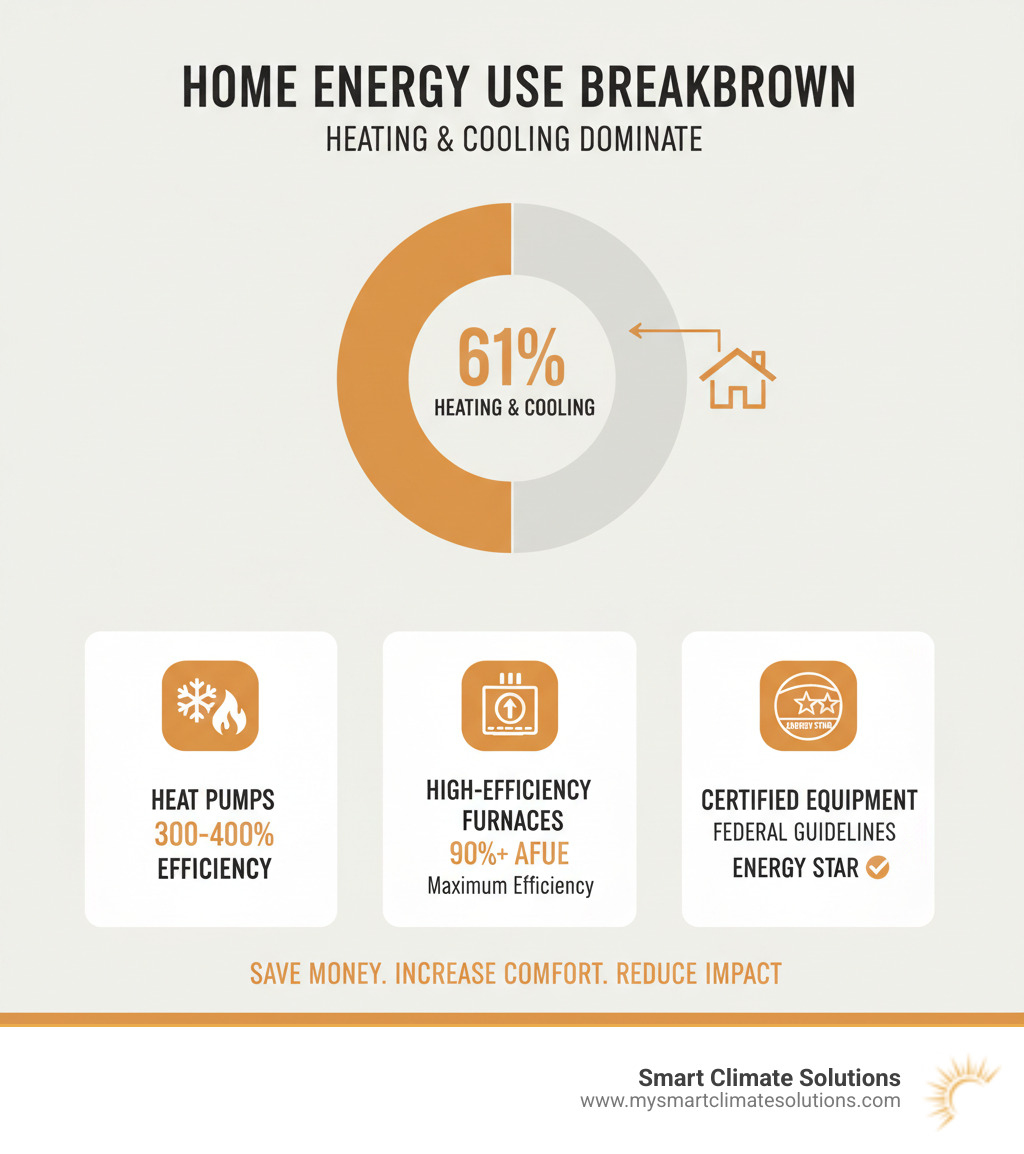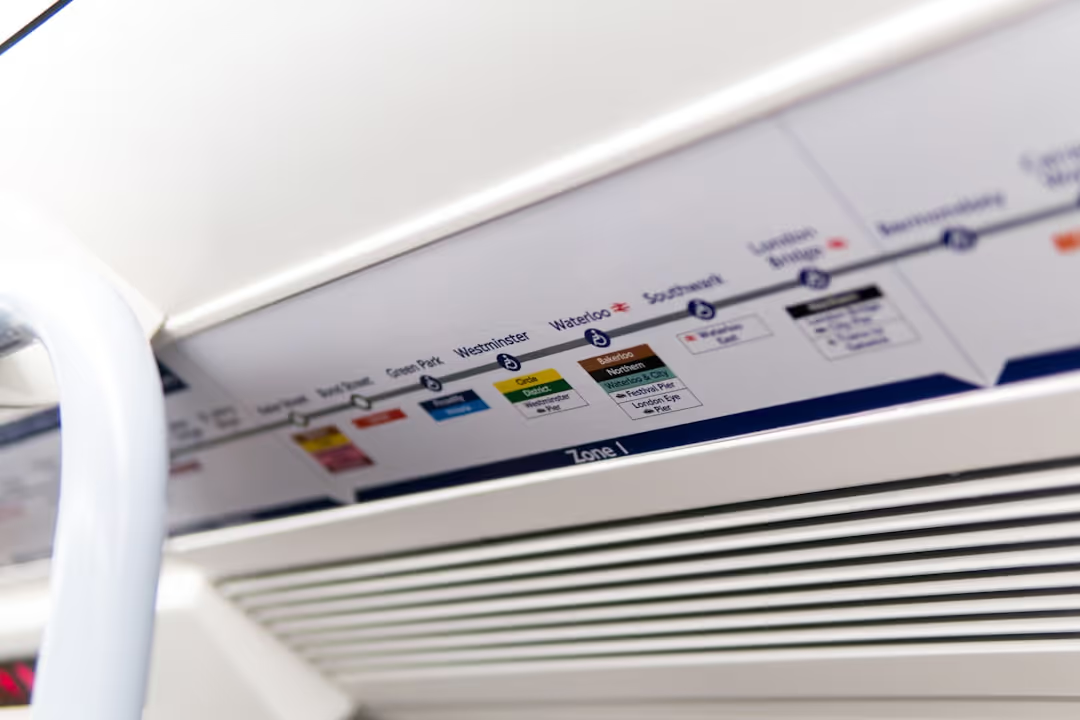The Future of Home Comfort is Efficiency
Energy efficient heating and air conditioning systems can transform your home's comfort and dramatically reduce your energy bills. Since heating and cooling account for nearly two-thirds of home energy use, upgrading to efficient HVAC technology is essential for homeowners facing rising energy costs.
Key Types of Energy Efficient HVAC Systems:
- Heat Pumps: Achieve 200-400% efficiency by moving heat, not creating it.
- High-Efficiency Furnaces: Boast AFUE ratings of 90% or higher.
- ENERGY STAR Certified Equipment: Meets strict federal efficiency guidelines.
- Variable-Speed Systems: Adjust output to match your home's precise needs.
- Geothermal Systems: Use stable ground temperatures for maximum efficiency.
Beyond lower utility bills, these systems offer better moisture control, improved indoor air quality, and quieter operation. By moving existing heat instead of creating it, heat pumps can deliver over four times more heat energy than the electrical energy they use. For Pittsburgh homeowners, the right efficient system can save thousands over the equipment's lifespan.
I'm Bill Scott, general manager of Smart Climate Solutions. With over 15 years of experience, my team and I have helped thousands of Pittsburgh-area homeowners select and maintain energy efficient heating and air conditioning systems. We focus on solutions that deliver real comfort and savings for Southwestern Pennsylvania's unique climate.

Energy efficient heating and air conditioning systems terms to remember:
Understanding Energy Efficiency Ratings: Decoding the Acronyms
Think of HVAC efficiency ratings like MPG for your car - they tell you how much energy you get for your buck. Understanding these numbers is key to choosing energy efficient heating and air conditioning systems that will lower your bills for years. While federal standards set minimums, the real savings come from exceeding them. You can find more info about energy efficient systems on our blog.
For Cooling: SEER and EER
For Pittsburgh's hot summers, two ratings matter for cooling efficiency: SEER and EER.
- SEER (Seasonal Energy Efficiency Ratio): Measures cooling efficiency over a whole season, like an average MPG. The higher the SEER, the less electricity you use. Today's systems can reach SEER ratings up to 42, far exceeding the federal minimum of 14.
- EER (Energy Efficiency Ratio): Measures efficiency at a peak condition (a 95-degree day). This shows how your system performs during a Western Pennsylvania heatwave.
Higher ratings on ENERGY STAR certified equipment mean lower utility bills, sometimes cutting cooling costs in half compared to older units.
For Heating: HSPF, COP, and AFUE
For heating, higher numbers always mean more heat for your energy dollar.
- HSPF (Heating Seasonal Performance Factor): This is the SEER equivalent for a heat pump's heating mode, measuring efficiency over a whole winter. Modern cold-climate heat pumps have HSPF ratings above 13, ideal for Pittsburgh.
- COP (Coefficient of Performance): This shows how much heat a heat pump produces versus the electricity it uses. A COP of 3 means 300% efficiency, as the system moves existing heat instead of creating it.
- AFUE (Annual Fuel Utilization Efficiency): This measures furnace efficiency as a percentage. An 80% AFUE furnace wastes 20% of its fuel. High-efficiency furnaces achieve 90-98% AFUE, maximizing the heat from your fuel.
Because furnaces create heat, they can't exceed 100% efficiency. Heat pumps move heat, allowing them to reach efficiencies of 200-400% or more, making them a cornerstone of modern energy efficient heating and air conditioning systems.
Exploring Energy Efficient Heating and Air Conditioning Systems
Today's energy efficient heating and air conditioning systems offer more options than ever, providing year-round comfort, better air quality, and significant energy savings. Finding the right fit for your Pittsburgh home depends on your budget, existing setup, and comfort goals. For a deeper dive, see our guide to residential HVAC system solutions.
The All-in-One Solution: Heat Pumps
Heat pumps are the versatile workhorses of modern HVAC, providing heating, cooling, and dehumidification in one unit. Instead of burning fuel to create heat, they move it.

In winter, a heat pump extracts heat from the outdoor air and moves it inside. In summer, it reverses the process, moving heat from your home to the outdoors. This process is incredibly efficient, allowing the system to produce up to four times more energy than it consumes.
Types of Heat Pumps: Air-Source vs. Ground-Source
- Air-Source Heat Pumps (ASHPs): The most common type, these systems are less expensive to install and use the outdoor air for heat exchange. Modern Cold Climate Heat Pumps (CCHPs) are engineered to work efficiently even in Pittsburgh's cold winters, performing well in temperatures as low as -25 F.
- Ground-Source (Geothermal) Heat Pumps: These systems use the stable temperature of the earth for heat exchange, making them the most efficient option available. However, they have a higher upfront cost due to the need for buried ground loops.
For most Pittsburgh homeowners, cold climate air-source heat pumps offer a fantastic balance of high efficiency, strong winter performance, and manageable installation costs.
Performance Tiers: Single-Stage, Two-Stage, and Variable-Stage
- Single-stage: The system is either on at 100% or off. This can lead to temperature swings and is the least efficient option.
- Two-stage: Runs at a low (e.g., 70%) or high speed, providing more consistent temperature and better efficiency.
- Variable-stage: The pinnacle of comfort and efficiency. The system adjusts its output in small increments to precisely match your home's needs, resulting in ultra-stable temperatures, superior humidity control, and quiet operation. For Pittsburgh's fluctuating weather, variable-stage systems are often the best choice.
System Configuration: Ducted vs. Ductless Mini-Splits
- Traditional Ducted Systems: Use a central unit and a network of ducts to distribute air. This is a great option if you have existing, well-maintained ductwork. Leaky or poorly sized ducts can waste energy, so an inspection is key. Our team can help with HVAC duct installation.
- Ductless Mini-Splits: Connect an outdoor unit to one or more indoor units without needing any ductwork. This allows for zoned heating and cooling, so you only condition the rooms you're using. They are perfect for older homes, additions, or as part of a whole home ductless HVAC solution for ultimate flexibility and efficiency.
Making the Switch: Installation, Costs, and Savings
Upgrading to energy efficient heating and air conditioning systems is a smart investment in your home's comfort and value. While the upfront cost is higher, the long-term savings make it worthwhile. Our expert HVAC installation services ensure your new system performs at peak efficiency from day one.
Key Installation Considerations
Proper installation is crucial for performance and longevity. Cutting corners leads to poor efficiency and premature failure.
- Proper System Sizing: We perform a detailed load calculation to ensure your system isn't overworked or oversized, which wastes energy and causes comfort issues.
- Ductwork Inspection: Leaky or poorly sized ducts can waste up to 30% of your conditioned air. We'll inspect and modify your ductwork to match the new system's requirements.
- Electrical Upgrades: Modern heat pumps may require electrical system upgrades. We coordinate with qualified electricians to handle this seamlessly.
- Professional Installation: Correct refrigerant charging, airflow settings, and electrical connections are vital. Improper installation can void your warranty and reduce efficiency.
The Hybrid Approach: Heat Pumps and Furnaces
For Pittsburgh's climate, a hybrid (or dual-fuel) system is often a perfect solution. It combines an ultra-efficient heat pump with a gas furnace.
- The heat pump handles all cooling and most heating needs, saving you money throughout the year.
- The furnace automatically takes over during extreme cold snaps, providing reliable, cost-effective heat when it's needed most.
Pro Tip: When replacing your AC, consider replacing the furnace too. An old furnace blower can limit your new AC's efficiency. Replacing them together ensures optimal performance and may qualify you for better rebates. Learn more about furnace replacement cost.
Open uping Savings: Costs, Rebates, and Incentives
While efficient systems have a higher initial cost, they deliver substantial lifetime savings, cutting heating and cooling costs by 30-50% or more. Several programs can lower your upfront investment:
- Federal Tax Credits: The Inflation Reduction Act offers a tax credit of up to 30% of the cost (max $2,000) for qualifying heat pumps.
- Local Utility Rebates: Pennsylvania utility providers offer rebates that can save you hundreds or thousands more.
We help our customers steer all available incentives to maximize their return on investment.
Maximizing Your Investment: Maintenance and Operation
Proper care and smart operation are key to getting the most from your new energy efficient heating and air conditioning systems. Just like a car, your HVAC system needs regular attention to deliver reliable comfort and long-term savings. For more ways to save, check out our energy saving HVAC tips.
The Importance of Regular Maintenance
Skipping maintenance on even the most advanced system is a recipe for trouble. Regular professional tune-ups are essential to:
- Extend Equipment Lifespan: Well-maintained heat pumps can last 15-20 years, but neglected systems often fail much earlier.
- Maintain Peak Efficiency: A tune-up, which includes cleaning coils and checking components, prevents dust and wear from driving up your energy bills.
- Prevent Costly Breakdowns: Catching small issues early, like a loose wire, can prevent a catastrophic failure costing thousands.
Consider our HVAC maintenance plan to keep your system running smoothly without the hassle of scheduling.
Best Practices for Daily Operation
Small habits can lead to big savings:
- Smart Thermostat Use: With a heat pump, avoid large temperature setbacks. Adjusting by just 2-3 degrees prevents the system from using inefficient backup heat.
- Keep Vents Clear: Ensure furniture, rugs, and drapes aren't blocking registers. Proper airflow is critical for efficiency.
- Change Air Filters Regularly: A clogged filter makes your system work overtime. Check your filter monthly and replace it every 1-3 months.
Our AC maintenance guide offers more seasonal tips.
Choosing the Right HVAC Contractor in Pittsburgh
Your relationship with your contractor is a long-term partnership. You need a team that understands your system and the Pittsburgh climate.
Look for a licensed, insured, and certified professional. Our technicians hold Section 608 certification for proper refrigerant handling and have over 15 years of experience in the Pittsburgh area. We understand the challenges of our humid summers and cold winters.
A reputable contractor will always start with a thorough home evaluation before making recommendations. At Smart Climate Solutions, our reputation is built on this local expertise and commitment to our customers. Your energy efficient heating and air conditioning systems are a major investment; trust it to a team that will help you protect it for decades to come.
Frequently Asked Questions about Energy Efficient HVAC
Here are answers to the most common questions we hear from Pittsburgh homeowners about energy efficient heating and air conditioning systems.
What is the most energy-efficient heating system?
While geothermal heat pumps are the most efficient (over 300%), they have a high upfront cost. For most Pittsburgh homes, a modern cold-climate air-source heat pump offers the best value, achieving 200-400% efficiency. High-efficiency furnaces (95%+ AFUE) are also excellent, especially when paired with a heat pump in a hybrid system. The best choice depends on your home, which is why we always start with an evaluation.
How long do energy-efficient HVAC systems last?
With proper annual maintenance, you can expect a long life from your investment. Air-source heat pumps and high-efficiency furnaces typically last 15 to 20 years. Geothermal systems are even more durable; the indoor unit can last 20-25 years, while the underground loop can last 50 years or more. Regular maintenance is the key to maximizing lifespan.
Are heat pumps effective in the cold winters of Pittsburgh, PA?
Yes, absolutely. Modern cold-climate air-source heat pumps are engineered to work efficiently even when temperatures drop well below freezing (down to -25 F). They are a proven and reliable solution for Pittsburgh's winters. For ultimate peace of mind, a hybrid system that pairs a heat pump with a furnace provides efficient heating year-round and a powerful backup for the absolute coldest days.
Conclusion: Your Next Step to a More Comfortable and Efficient Home
Upgrading to energy efficient heating and air conditioning systems is an investment in your comfort, your wallet, and the environment. Modern systems deliver remarkable cost savings, superior comfort with consistent temperatures, and a smaller carbon footprint.
However, the right system is a custom solution. Your home's unique characteristics and Pittsburgh's climate patterns determine which option will provide the best performance. This is where expert guidance is invaluable.
For homeowners throughout the Pittsburgh area - including the South Hills, Burgettstown, Washington, Steubenville, St. Clairsville, and Weirton - Smart Climate Solutions offers over 15 years of local expertise. We know which energy efficient heating and air conditioning systems perform best in our climate and how to install them for maximum savings and reliability.
Our team will guide you through every step, from the initial home assessment and system selection to navigating rebates and tax credits. We ensure your new system is a perfect fit for your home and budget.
Ready to create a smarter, more comfortable, and more efficient home? Contact us today to learn more about our HVAC services and schedule your consultation.






.avif)
.avif)
.png)
